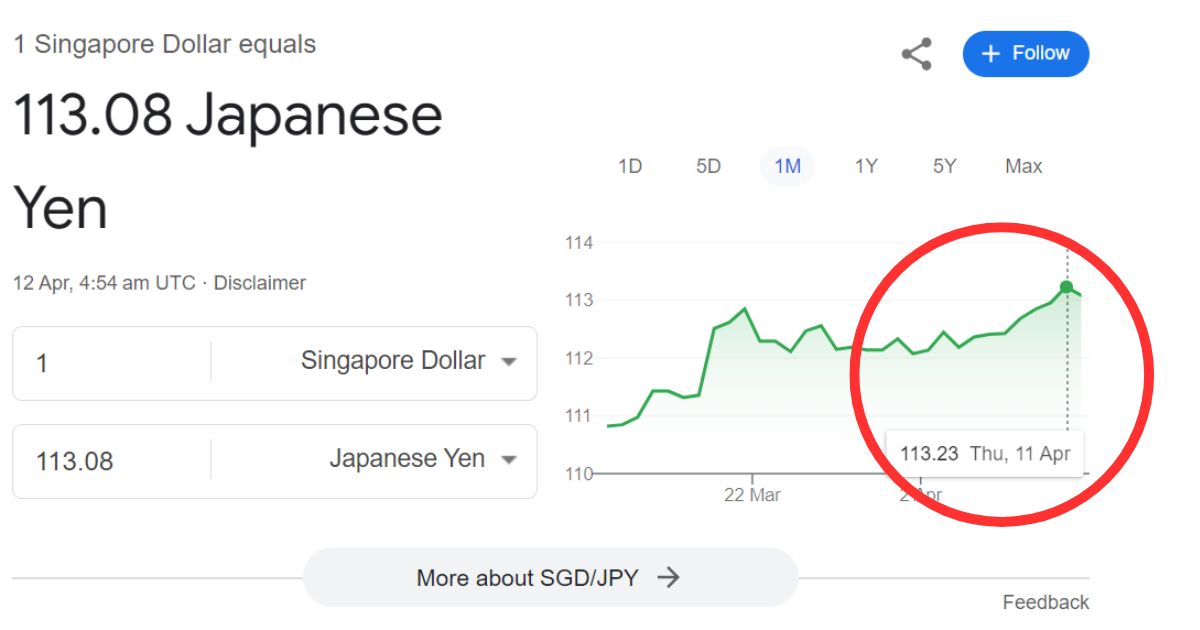For the past few weeks, it seems like everybody and their mother is in either Japan or Korea.
I guess this is understandable, as it’s cherry blossom season right now.

Thousands of cherry blossom trees are blooming all over Japan and Korea, causing many tourists to flock to these countries to take a billion Insta-worthy pictures.
But, there’s another factor pulling tons of Singaporeans to the land of anime – the exchange rate.
¥113.23 to S$1
For the past year or so, we’ve been hearing much about how the Japanese yen is weakening. For a while now, the yen has been one of the worst performing currencies.
And, just yesterday, the yen reached an all-time low.
The Japanese yen fell to its lowest levels against the Singapore dollar on 11 April, hitting ¥113.23 to S$1.

This record comes just weeks after a 34-year low of ¥112.85 to S$1, which was hit in late March 2024.

The yen has been steadily declining in recent years, and the currency has lost about a third of its value since the beginning of 2021.
Implications
Due to the yen’s decline, tourists visiting Japan will see their currencies go further. This could, in turn, increase the number of visitors to Japan.
As for Japanese companies that export goods across the globe, they stand to see larger profits from making their revenue in non-yen currencies.
Unfortunately, the decline of the yen also means that the costs of importing goods will increase. Goods such as energy, food, and more will become more pricey due to the weakening of the yen.
As Japanese households tend to be net importers, those living in Japan are likely to experience increased cost of living.
Japanese Government May Need To Intervene Again
Two years ago, the Japanese government stepped in when the yen dropped to ¥151.95 against the US dollar.
The Japanese government is currently watching the yen with a high sense of urgency, ready to intervene at any time if necessary, so this might not last.
What Causes A Currency To Depreciate
There are several factors that contribute to the depreciation of a currency.
Reader: Oh boy, you’re starting to sound like my econs teacher.
In the foreign exchange market, interest rates and momentum have a big impact on how currencies like the yen behave.
Because interest rates for the yen are really low, people are able to borrow yen easily and sell it to other countries that give them better returns, causing the value of the yen to go down.
This is known as a “carry trade“.
Short-term interest rates in Japan are very low, while in the US, they’re much higher.
This makes the US dollar more attractive, incentivising people to sell yen to buy US dollars. This then causes the yen to depreciate.
Last month, Japan’s central bank made a historic shift out of negative interest rates.
However, since this change was expected and won’t lead to big rate increases, investors aren’t worried by this change.
This low interest rate situation has encouraged big Japanese investors to keep their money outside of Japan, where they can benefit from higher rates to earn more money.
The Situation May Improve For Japan
Although the yen has been weakening, analysts are saying things could start looking up this year for Japan.
As mentioned earlier, the Japanese government has expressed concern about the Yen’s weakness and may intervene in the currency market.
The Japanese government may decide to buy yen, which would strengthen its value.
If Japan’s domestic economy shows signs of improvement, Japanese investors may be less inclined to seek higher returns overseas.
This could reduce outward capital flows and keep more investment funds within Japan, supporting the yen’s value.
Moreover, experts have noted that investor interest has increased materially in recent months. Japanese equities now illustrate an impressive risk/reward profile, reflecting cheap valuations, strong earnings growth and significant improvements in corporate governance.
The yen may appreciate as a result of large capital inflows into the domestic equity market.
The Bottom Line
If all the talk about exchange rates and markets is boring you, here’s all you need to know: it is now more affordable than ever to visit Japan.
For now.
So, what are you waiting for?
It’s time to book a flight to Japan.
Would you be jailed for being half-naked in public? Well, the answer will shock you. Seriously. Watch this to the end and you'll understand:



